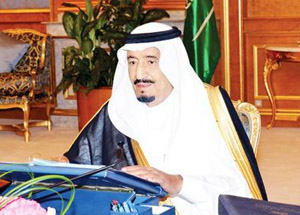 Jeddah, Jun 17: Saudi Arabia rejected Monday the idea of any foreign interference in Iraq and blamed Baghdad’s “sectarian and exclusionary” policies for the worsening security situation in the country.
Jeddah, Jun 17: Saudi Arabia rejected Monday the idea of any foreign interference in Iraq and blamed Baghdad’s “sectarian and exclusionary” policies for the worsening security situation in the country.
Fighters from the Islamic State of Iraq and the Levant (ISIL) have seized several Iraqi cities, threatening to split the country down sectarian lines, a deeply worrying prospect for the region and beyond.
The crisis “would not have happened if it wasn’t for the sectarian and exclusionary policies that were practiced in Iraq in past years and which threatened its security, stability and sovereignty,” the Council of Ministers said.
The Cabinet, chaired by Deputy Custodian of the Two Holy Mosques Prince Salman, said it was necessary to “preserve Iraq’s sovereignty” and rejected any outside interference in Baghdad’s internal affairs. It also urged the “quick formation of a national consensus government.”
Militants, spearheaded by ISIL and joined by supporters of former President Saddam Hussein, have in the past week overrun a large chunk of northern and north-central Iraq, although their advance has since been slowed.
Saudi analyst Abdel Aziz Al-Sagr said Riyadh was concerned its US ally might give Tehran its tacit blessing for intervention in Iraq. “We need regional coordination over Iraq, not a US-Iranian dialogue,” said Al-Sagr.
Qatar’s Foreign Minister Khaled Al-Attiyah said the trigger for the unrest was the marginalization of Iraq’s Sunni Arabs. He cited as examples the crackdown by security forces on peaceful protests by the minority community in April 2013 and January this year. “This has deepened the divide between the components of the brotherly Iraqi people,” Al-Attiyah said in comments reported by the official Qatari news agency late on Sunday.
“Nouri Al-Maliki is worse, and more dangerous, than ISIL and Al-Qaeda,” said columnist Abdul Rahman Al-Rashed. “He is a bad person who is ready to commit massacres to stay in power.”
Culture and Information Minister Abdul Aziz Khoja said the Cabinet also emphasized the importance of protecting and alleviating the suffering of civilians.
The Cabinet welcomed the final statement of the International Summit to Combat Violence in Conflict Zones held in London. It reiterated the Kingdom’s appeal to the international community to take measures, including passing legislation, to uphold the rights of women, and protect civilians in conflict zones. Such actions should be treated as crimes against humanity and perpetrators punished, the Cabinet said.
The Cabinet called for concerted international efforts to counter terrorism, which it described as the most serious challenge facing the world.
It stressed that the establishment of the rule of law, development, education, and dialogue were the most effective ways to eradicate the root of the problem, Khoja said.
The council reviewed the meeting of the Organization of Petroleum Exporting Countries (OPEC) in Vienna, including its discussions on the state of the international oil market and decisions to maintain the current production ceiling until the end of the year.
Spelling out other Cabinet decisions, Khoja said it exempted the Makkah Trains Company from having to issue tenders for the work in the city. Competition would be limited to the companies that were initially invited and qualified. The contracts would be based on those adopted by the International Federation of Consulting Engineers, it said.
The Makkah Trains Company would manage the implementation of the project and submit its annual budget to the supervisory committee. The executive committee would oversee the budget.
The Cabinet authorized the head of the Youth Welfare Presidency to discuss with Korea a draft memorandum of understanding for sports cooperation. It also inducted four new members onto the board of directors of the Saudi Exports Development Authority (SEDA) for three years.
The Cabinet approved another bill to regulate the activities of female beauty parlors. Those running the parlors should obtain licenses from the municipality, which would be issued with the Commission for the Promotion of Virtue and Prevention of Vice, and Civil Defense.
The activities would be limited to activities related to the beauty industry. There would be strict control in terms of Islamic law. Females applying for licenses should be Saudi, and not younger than 25, except for those who have obtained a diploma in the field from a technical college. The licensed woman should commit to manage the shop by herself or appoint a full-time Saudi manager.
The Cabinet appointed Mohammad bin Saleh Almonas director general of the Department of Technical Affairs; Salman bin Abdulaziz Shuwaiheen director general of the department of expatriates at the Ministry of Interior; and Ali bin Abdullah Alhamda sector chief at the Ministry of Finance.





Comments
Add new comment